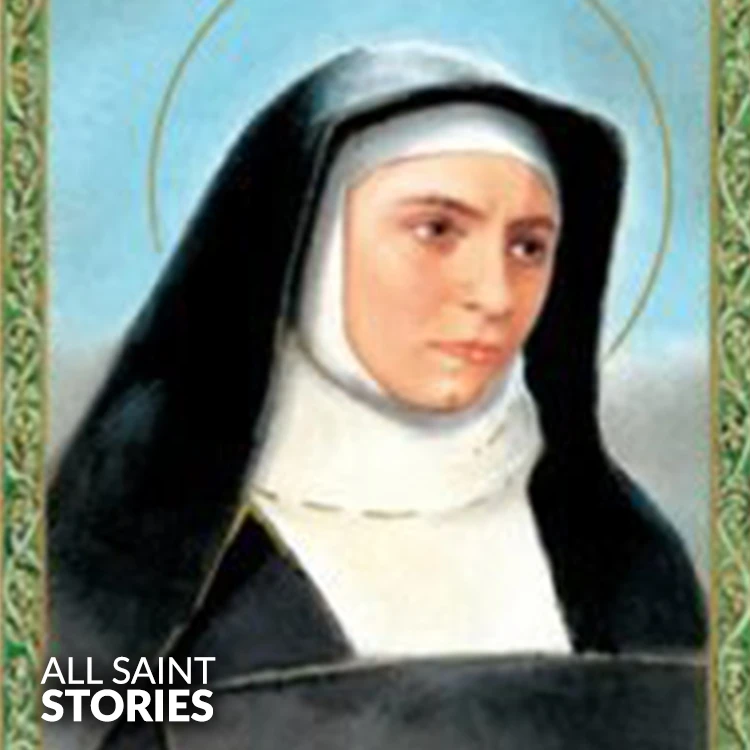"Saint Edith Stein, A woman of deep faith and wisdom, Guide us on our journey of truth and love. Help us to seek understanding, To embrace suffering with grace, And to follow Christ with courage and humility. Intercede for us before God, That we may grow in holiness and bring peace to the world. Amen."
ST. EDITH STEIN
ST. EDITH STEIN

Saint Edith Stein, a Jewish philosopher who converted to Catholicism and became a Carmelite nun, is known for her profound spirituality, intellectual contributions, and martyrdom at Auschwitz during the Holocaust. She was canonized by Pope John Paul II in 1998.
Saint Edith Stein, also known by her religious name Teresa Benedicta of the Cross, was born on October 12, 1891, in Breslau (now Wrocław, Poland), Germany, into a Jewish family. Her life is a remarkable journey of intellectual pursuit, spiritual conversion, and martyrdom.
Stein was highly intelligent and earned a doctorate in philosophy under the guidance of renowned philosopher Edmund Husserl. She became a respected scholar in the field of phenomenology and taught at various universities. Her life took a dramatic turn, however, when she encountered the Catholic faith. Edith, initially an atheist, was deeply influenced by the autobiography of St. Teresa of Ávila, which led her to convert to Catholicism in 1922. Her conversion was a turning point, marking the beginning of her spiritual journey toward a profound connection with Christ.
After her conversion, Edith felt a calling to the religious life and entered the Carmelite convent in 1933, taking the name Teresa Benedicta of the Cross. In her Carmelite life, she combined her intellectual and spiritual gifts, writing numerous works on theology, philosophy, and spirituality. She became known for her contemplative life and deep faith, as well as for her commitment to the Catholic Church’s teachings on the dignity of the human person.
In 1940, as the Nazis began their campaign of terror against Jews, Edith Stein, a Jew by birth, was forced to leave her Carmelite community in Germany. She was eventually arrested by the Nazis in 1942 and transported to Auschwitz, where she was martyred, along with her sister Rosa, who had joined her in the convent. On August 9, 1942, she was killed in a gas chamber at Auschwitz-Birkenau.
Despite her tragic and premature death, Saint Edith Stein’s life continues to inspire countless individuals. Her intellectual work, particularly in the areas of philosophy and psychology, continues to be studied, and her writings on the intersection of faith, reason, and human dignity have left a lasting impact on Christian thought.
She was canonized by Pope John Paul II on October 11, 1998, and is recognized as a martyr of the Catholic Church. She is also the patroness of Europe and of those who suffer from oppression. Her legacy endures through her writings, her example of faith, and her extraordinary courage in the face of suffering.
Video Not Found
The information on this website is compiled from various trusted sources. While we aim for accuracy, some details may be incomplete or contain discrepancies.
If you notice any errors or have additional information about this saint, please use the form on the left to share your suggestions. Your input helps us improve and maintain reliable content for everyone.
All submissions are reviewed carefully, and your personal details will remain confidential. Thank you for contributing to the accuracy and value of this resource.
Credits & Acknowledgments
- Anudina Visudhar (Malayalam) – Life of Saints for Everyday
by Msgr. Thomas Moothedan, M.A., D.D. - Saint Companions for Each Day
by A. J. M. Mausolfe & J. K. Mausolfe - US Catholic (Faith in Real Life) – Informational articles
- Wikipedia – General reference content and images
- Anastpaul.com – Saint images and reflections
- Pravachaka Sabdam (Malayalam) – Saint-related content and insights
We sincerely thank these authors and platforms for their valuable contributions. If we have unintentionally missed any attribution, please notify us, and we will make the correction promptly.
If you have any suggestion about ST. EDITH STEIN
Your suggestion will help improve the information about this saint. Your details will not be disclosed anywhere.
© 2026 Copyright @ www.allsaintstories.com





 English
English
 Italian
Italian
 French
French
 Spanish
Spanish
 Malayalam
Malayalam
 Russian
Russian
 Korean
Korean
 Sinhala
Sinhala
 Japanese
Japanese
 Arabic
Arabic
 Portuguese
Portuguese
 Bantu
Bantu
 Greek
Greek
 German
German
 Dutch
Dutch
 Filipino
Filipino